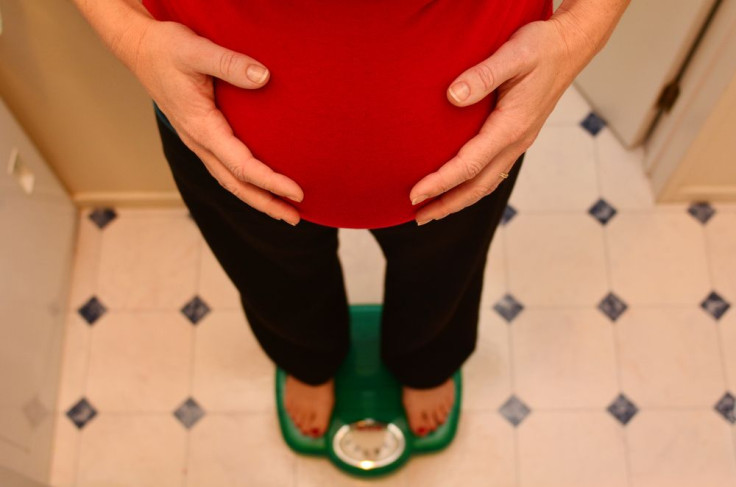Childhood Obesity Risk Swells When Mother Is Obese, Smokes: Living Healthy For Two

Childhood obesity has more than doubled in the past 30 years. Aside from the psychological effects that extra weight can have on a child, it is also a serious physical health concern. Obesity puts young people at a significantly increased risk for multiple conditions, including heart disease, diabetes, and bone and joint problems. Interestingly, research continues to show that much of childhood obesity is actually predetermined by events that occur even before conception. A recent study has confirmed five factors can contribute to future obesity in a woman's unborn child, many of which occur even before conception. Researchers hope that by making these factors well known, women will consciously prepare their bodies for pregnancy.
Critical Period For Childhood Health
Obesity is not as simple as overeating. Other factors play a role in this debilitating and life-threatening condition. Scientists from the Medical Research Council Lifecourse Epidemiology Unity at the University of Southampton in England pointed out five risks factors of a pregnancy and early life that increased a child’s risk of obesity. These include: breastfeeding for less than a month, mother’s obesity at time of pregnancy, mother gaining excess weight during pregnancy, mother’s smoking habits, and a low vitamin D level.
In a study now published in The American Journal of Clinical Nutrition, researchers analyzed data from 991 children in order to determine just how many of these factors influenced a child’s weight in later life. For example, at age 4, children with four or five of these factors were 3.99 times more likely to be overweight or obese than children who had experienced none, and fat mass was, on average, 19 percent higher, the press release reported. Two years later, these children were nearly five times more likely to be overweight or obese and had an average fat mass 47 percent higher than their peers. According to the researchers, these numbers remained the same even when factors such as the children’s diet and average exercise were taken into account.
"Early life may be a 'critical period' when appetite and regulation of energy balance are programmed, which has lifelong consequences for the risk of gaining excess weight," explained lead researcher Dr. Sian Robinson in the press release. Robinson explained, based on the evidence found, early prevention against childhood obesity needs to start even before the child is conceived, and that having "a healthy body weight and not smoking at this time could be key."
It’s not just that the fat or toxins are passed from mother to child in-vitro; it’s believed that these lifestyle choices of the mother can actually affect her unborn child’s DNA. Known as epigenetic changes, it’s been observed that certain non-biological factors influence how DNA is expressed, and these changes can then be passed on from mother to offspring.
"The reality is we can now say with great certainty that the child doesn’t quite start from scratch — they already carry over a legacy of factors from their parents’ experiences that can shape development in the fetus and after birth," Dr. Sarah Robertson from the University of Adelaide wrote in Science last year, commenting on how a mother's lifestyle influences her children, the Daily Mail reported.
How To Give Children The Best Start In Life
A recent study found that one of the most effective ways to get pregnant women to quit smoking was by giving them a prize. The UK study found that 23 percent of women quit smoking during their pregnancy if they were offered a financial incentive, either in the form of a coupon or gift card. Along with helping women to kick the habit, it was also found that women who received an incentive experienced fewer cravings, although the residual urge to relapse remained.
As for obesity during pregnancy, this issue is of particular concern, since, according to the Daily Mail, almost half women of child-bearing age are overweight or obese. More than 15 percent are in the “dangerously overweight” category. Obesity, both prior to conception and during the pregnancy is not only a heath concern for the unborn child but also the mother. Obese pregnant women experience greater risk of a number of conditions, including: gestational diabetes, infection, sleep apnea, labor problems, and even increased risk of miscarrying.
It’s advised by the Institute of Medicine that women who were not considered overweight prior to their pregnancy gain between 25 to 35 pounds. However, for overweight women, it’s advised that they gain only between 15 and 25 pounds. These are only suggestions, however, and it’s best that women who are either pregnant or looking to become pregnant speak with their doctor on what the best weight gain plan for their specific body may be, in order to ensure the health of both mother and baby. Working out a proper diet plan with the help of a doctor will also ensure that both mommy and baby are getting adequate amounts of vitamin D.
Decreases in time spent breastfeeding is largely a cultural problem. None of the top 10 countries with the highest breastfeeding rates exist in Europe or North America, suggesting social trends have an influence on a woman’s decision to breastfeed or not. The Wall Street Journal reported that in the United States the percentage of women who breastfeed is below public health goals. The researchers hope that their study will help aid the effort already being taken by public health officials in order to encourage more women to breastfeed.
Source: Robinson S, et al. The American Journal of Clinical Nutrition. 2015.



























